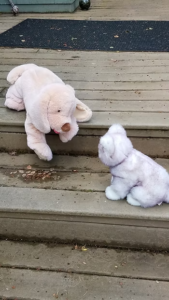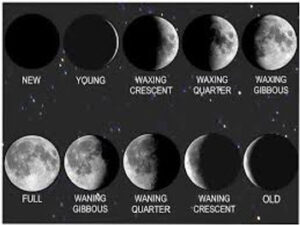Updated: May 31, 2020
Feb 9, 2015
We’ve been talking about getting prepared for emergencies. We started with the most obvious need – water. So, if you haven’t been with us, look back through December 2014 and January 2015 to see how the Richens picked out a barrel safe for drinking water and a hand pump for each of the families on our Christmas list.
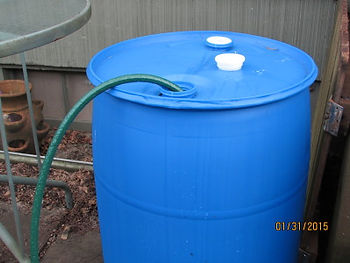
Here we are in February and have you filled your barrel? No? I hope at least that you have decided to buy one and are setting it up. As we set up ours, we found a flat place out of the sun and not destined to be under a lot of debris after an earthquake, or under water when the creek rises. In our yard, that place was the north side of the house, near the water spigot and also near the side porch.
And now, my well-prepared friends, it’s time for us to fill our drinking water barrel and test the system. Just turn on the spigot and there you go, right?
Not so right. While searching for our barrels and the water pumps, I discovered the Cancerous Garden Hose Controversy. It turns out that garden hoses are made with some chemicals you don’t want your family drinking. Lead is the most obvious problem. It comes out of garden hoses in rates up to 18 times higher than the federal drinking standard. Moreover, there are other chemicals in your garden hoses that cause cancer, including some we recently worked to take out of children’s toys.*¹
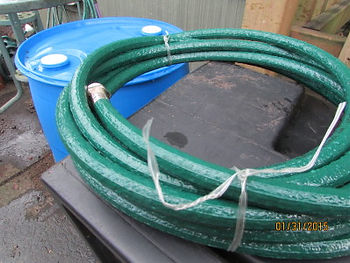
“What? ” you say. “My garden hose has dangerous chemicals?”
This is not evidence of a conspiracy. Garden hose manufacturers are expecting you to drink water inside your house and water the lawn outside. The safety police haven’t told them that people may be filling barrels with water to drink in case of an emergency. And no one in authority has come to the conclusion that lead in garden water might not be great for your soil.
Soil studies exist, showing a possible negative effect, but you know what’s been happening with climate change studies, right? Study, re-study, write definitive papers and then engage in debate with each other where money is mightier than reason*². Thus, we can guess that lead in your garden soil is at least two years from debate, so we hose users might as well change what we can change, eh?
And that means we find a type of hose NOT made with lead. It turns out that there are manufacturers of drinking-water-safe hoses. More costly, but safe. rubber or polyurethane hoses are the go-to material.
A little online research gives us opportunities to buy these types of hoses and have them shipped to us. Brand names advertised as drinking water safe can be found at the following stores and websites: Amazon, Sears, Home Depot, elementhose.com and many other places. Go look out there because this is not an exhaustive list.
So, yeah! for the makers of safe-to-drink hoses!
I hoped to find such hoses in Portland, Oregon, where I live, so I called several hardware stores. I got some clerks for whom “Huh?” is the go-to answer, but still, I almost always got passed to the person who knows. Both of my local hardware stores, Beaumont Hardware on N.E. 43nd and Fremont Street*³ and Park Rose Hardware on N.E 120th and Sandy Boulevard both carried rubber and polyurethane hoses. Beaumont Hardware carries the Element brand in 25 foot ($13) and 50 foot lengths ($27). A good price.
Park Rose Hardware carries the Contractor’s Choice brand of polyurethane hose. There were rubber hoses at Park Rose Hardware as well, but the ones they carried were designed to use with hot water, and store indoors. So, rubber of this type is not exactly what we’re looking for.
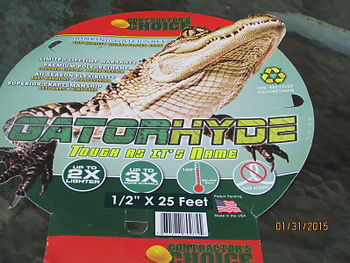
Contractor’s Choice, a Eugene, Oregon company makes a polyurethane hose called Gatorhyde (Tough as its Name) The 25 foot length cost almost $30 and has a limited lifetime warranty. The 50 foot Gatorhyde costs $ 40.
At my hardware store, the lady who knows hoses told me this was the hose she would buy because it is light, yet tough and easy-handling. The hose remains flexible above 165 degrees and below zero.
Moreover,*4 the hose ends are not brass, but nickel plate. That means gone is another source of lead. (Brass is copper plus zinc with lead. The lead leaches out into your water.)
So, I bought the Gatorhyde version and brought it home, happy as a well-fed gator.
Those of you who have been following this blog on disaster readiness, may wonder if I paid for five hoses for my five families. Nope. Too close to the Christmas purchase of five barrels and five steel hand pumps. I bought one. This hose will make the rounds of the five houses in short order, filling five barrels and then it will be stored in our garage until time to empty and refill the barrels with fresh water.
How often will you refill, you ask?
Well, guess what. Mold free water is the subject of another blog. Coming soon at https://www. raerichen.com/blog
Rae: Always Asking
OH! About my stars *** in this blog? See below:
*1 Other not so drinkable chemicals in hoses include cadmium and the phthalate DEHP at 4 times higher than federal drinking water standards (see ecocenter.org for the study by the Ecology Center in Ann Arbor Michigan, and healthy-stuff.org for further discussion.)
*2 “Money is mightier than reason?” you ask. And I respond, “When did you stop paying attention to reality?”
*3 Yes, Portland, Oregon has a Fremont Street named after this explorer and politician who had nothing to do with Oregon. Naming choice of the developer? Not sure. There is a process for changing street names in Portland, thank goodness.
*4 Moreover? Bet you haven’t seen that word since you took your one and only class in British- Literature. Evidently, the word Moreover was alive and well in Arkansas in the 20th century, because it was a favorite of my mother. As in “Moreover, Sharon Rae, if your room isn’t clean by six o’clock . . . “ You get the meaning.

